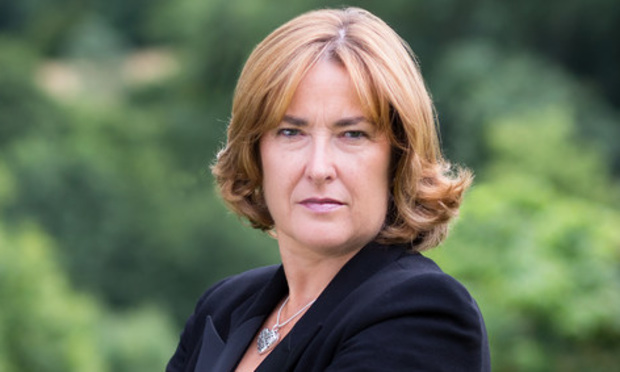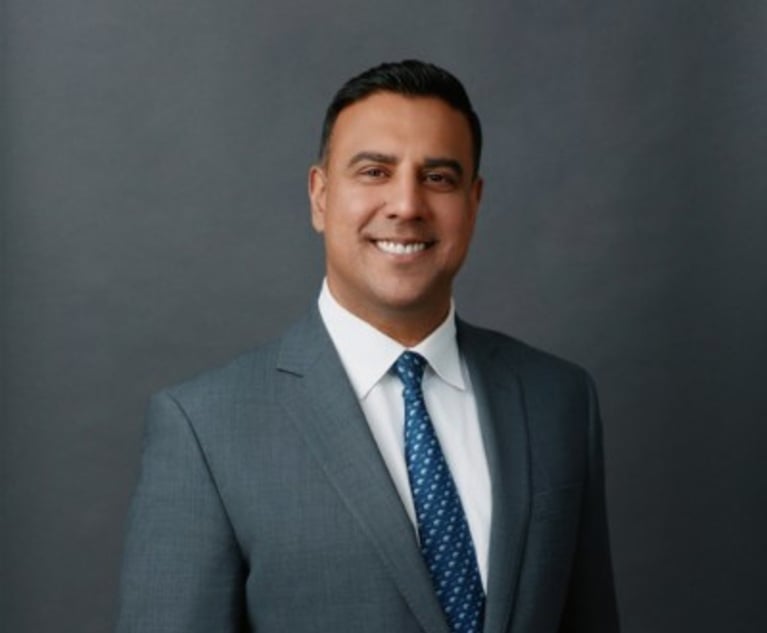Rosenblatt aims to 'rewrite the rule book' for litigation funding after record UK law firm IPO
City firm to use proceeds from largest UK law firm listing to fund litigation 'in-house'
May 08, 2018 at 08:36 AM
4 minute read
 Rosenblatt CEO Nicola Foulston
Rosenblatt CEO Nicola Foulston
Rosenblatt is planning to use the proceeds of its AIM listing to set up a commercial litigation fund as the firm looks to "rewrite the rule book" in the competitive litigation finance market.
The City practice, which became the fourth-ever law firm to float on the London Stock Exchange this morning (8 May), plans to use the proceeds from its listing to fund litigation 'in-house', while also acquiring other law firms to fuel its growth.
Rosenblatt raised approximately £43m from the listing, which was significantly oversubscribed, making it the largest UK law firm IPO to date, ahead of Gateley's 2015 float, which raised £30m, and those of Gordon Dadds and Keystone last year, which raised £20m and £15m respectively.
After deducting costs and fees, the listing has handed Rosenblatt net proceeds of £31.8m, of which about £20m will be used to repay loans and tax liabilities.
Rosenblatt chief executive Nicola Foulston said the remaining funds would be used for 'in-house' litigation funding and the acquisition of "high-margin or specialist firms that fit with our profile".
Foulston added: "We are looking at acquiring litigation boutiques, law firms or teams. We are looking at the high-margin end, and we want to do this before moving into third-party litigation funding."
In third-party-funded litigation, some or all of the costs of bringing a case to court are funded by a neutral party. Typically, if the case is successful, the funders will receive a share of the financial recovery.
Rosenblatt is aiming to differentiate itself from more costly litigation funders. "We are challenging the model with a view to rewriting the rule book," Foulston added. "Litigation funders do not have an in-house law firm engine. We can also remove the exorbitant costs by charging lower rates. "
The firm now plans to spend up to 12 months setting up a fund, with the aim of securing several acquisitions – either of disputes boutiques or teams of litigators – beforehand.
Foulston commented: "One reason for the delay in setting this up is that we must have absolutely the right structures in place. When you do third-party litigation funding, you can't do it within the law firm itself – there would be a separate entity within the group, owned by the Rosenblatt PLC, which would be separately regulated. There would be a steel curtain between the two entities."
The firm is targeting the medium-sized claims market, in the region of £10m to £200m. Initially, before launching a separately regulated third-party fund, it will provide litigation funding in-house.
Foulston explained: "We are keen to establish a track record in this area. We are probably the first law firm to have raised money on our own balance sheet to fund litigation cases. We do not yet provide third-party litigation funding in the way Burford Capital does, but we are moving in that direction.
"Our first step will be taking on partial risk in a case. There are big corporates out there who don't want to take fees on risk and we can put it on our balance sheet. They are asking us to have skin in the game."
The firm, which said it also plans to make significant investments in its IT and artificial intelligence systems, has used the listing to challenge the limitations of traditional law firm management structures.
In a statement, the firm said: "Many law firms continue to be managed by senior partners, who often have little or no commercial management experience. These firms often suffer from the impact of being run by a management team made up of lawyers who often lack professional business management skills and who are required to forego work on fee-earning transactions to manage the business.
"Rosenblatt has addressed this through the appointment of a professional, experienced and specialist management team, which the directors believe sets the company apart from many of its competitors."
Rosenblatt is a single-office London practice led by Foulston and senior partner Ian Rosenblatt, who founded the firm in 1989. It has 45 fee earners, primarily focusing on litigation, as well as corporate, finance, construction and projects, employment, financial services, technology, media, real estate and tax.
Foulston sits on a board of directors that also includes former Nabarro partner Brook Land and ex-DAC Beachcroft finance director Patrick Firebrace. Foulston took over the commercial management of the firm in September 2016, having been a client for nearly 30 years.
The firm expects that a first dividend for the period from May to September 2018 will be paid out before the end of the year.
This content has been archived. It is available through our partners, LexisNexis® and Bloomberg Law.
To view this content, please continue to their sites.
Not a Lexis Subscriber?
Subscribe Now
Not a Bloomberg Law Subscriber?
Subscribe Now
NOT FOR REPRINT
© 2025 ALM Global, LLC, All Rights Reserved. Request academic re-use from www.copyright.com. All other uses, submit a request to [email protected]. For more information visit Asset & Logo Licensing.
You Might Like
View All
Hogan Lovells Hires Team of Top White & Case Corporate and Finance Partners in Italy
2 minute read
Clifford Chance, Milbank Steer Yondr Group’s $900M Debt Financing in Malaysia

Kirkland, Paul Hastings, White & Case, Freshfields advise on Top German Deals
2 minute readTrending Stories
- 1Inherent Diminished Value Damages Unavailable to 3rd-Party Claimants, Court Says
- 2Pa. Defense Firm Sued by Client Over Ex-Eagles Player's $43.5M Med Mal Win
- 3Losses Mount at Morris Manning, but Departing Ex-Chair Stays Bullish About His Old Firm's Future
- 4Zoom Faces Intellectual Property Suit Over AI-Based Augmented Video Conferencing
- 5Judge Grants TRO Blocking Federal Funding Freeze
Who Got The Work
J. Brugh Lower of Gibbons has entered an appearance for industrial equipment supplier Devco Corporation in a pending trademark infringement lawsuit. The suit, accusing the defendant of selling knock-off Graco products, was filed Dec. 18 in New Jersey District Court by Rivkin Radler on behalf of Graco Inc. and Graco Minnesota. The case, assigned to U.S. District Judge Zahid N. Quraishi, is 3:24-cv-11294, Graco Inc. et al v. Devco Corporation.
Who Got The Work
Rebecca Maller-Stein and Kent A. Yalowitz of Arnold & Porter Kaye Scholer have entered their appearances for Hanaco Venture Capital and its executives, Lior Prosor and David Frankel, in a pending securities lawsuit. The action, filed on Dec. 24 in New York Southern District Court by Zell, Aron & Co. on behalf of Goldeneye Advisors, accuses the defendants of negligently and fraudulently managing the plaintiff's $1 million investment. The case, assigned to U.S. District Judge Vernon S. Broderick, is 1:24-cv-09918, Goldeneye Advisors, LLC v. Hanaco Venture Capital, Ltd. et al.
Who Got The Work
Attorneys from A&O Shearman has stepped in as defense counsel for Toronto-Dominion Bank and other defendants in a pending securities class action. The suit, filed Dec. 11 in New York Southern District Court by Bleichmar Fonti & Auld, accuses the defendants of concealing the bank's 'pervasive' deficiencies in regards to its compliance with the Bank Secrecy Act and the quality of its anti-money laundering controls. The case, assigned to U.S. District Judge Arun Subramanian, is 1:24-cv-09445, Gonzalez v. The Toronto-Dominion Bank et al.
Who Got The Work
Crown Castle International, a Pennsylvania company providing shared communications infrastructure, has turned to Luke D. Wolf of Gordon Rees Scully Mansukhani to fend off a pending breach-of-contract lawsuit. The court action, filed Nov. 25 in Michigan Eastern District Court by Hooper Hathaway PC on behalf of The Town Residences LLC, accuses Crown Castle of failing to transfer approximately $30,000 in utility payments from T-Mobile in breach of a roof-top lease and assignment agreement. The case, assigned to U.S. District Judge Susan K. Declercq, is 2:24-cv-13131, The Town Residences LLC v. T-Mobile US, Inc. et al.
Who Got The Work
Wilfred P. Coronato and Daniel M. Schwartz of McCarter & English have stepped in as defense counsel to Electrolux Home Products Inc. in a pending product liability lawsuit. The court action, filed Nov. 26 in New York Eastern District Court by Poulos Lopiccolo PC and Nagel Rice LLP on behalf of David Stern, alleges that the defendant's refrigerators’ drawers and shelving repeatedly break and fall apart within months after purchase. The case, assigned to U.S. District Judge Joan M. Azrack, is 2:24-cv-08204, Stern v. Electrolux Home Products, Inc.
Featured Firms
Law Offices of Gary Martin Hays & Associates, P.C.
(470) 294-1674
Law Offices of Mark E. Salomone
(857) 444-6468
Smith & Hassler
(713) 739-1250









